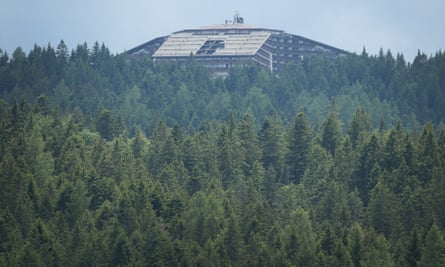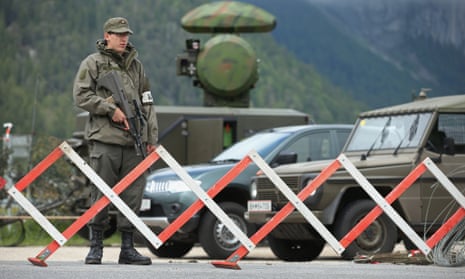The clock has struck midnight. The dream is over. Back at the G7 summit, barely a day and 20 miles from here, I was treated like a prince. I was one of the chosen 3,000 journalists who were primped, pampered, fed and burped, given free T-shirts, gallons of goulash, buckets of booze, and all the cheesy footage of world leaders we could swallow. We lay back on our branded beanbags and were tickled silly by the gentle fist of the G7 PR machine. But not any more. The beanbag has burst.
“Step out of the vehicle and show me your identification!” A group of Austrian police officers took up position round my car. I pulled on the handbrake and opened the door. I swear to God one young officer shifted his hand to the butt of his sidearm, like I was about to rush them. All 12 of them. All armed. Maybe if there had only been 10 I might have taken them down using a slingshot improvised from my shoelaces, but not 12. I might be crazy but I’m not nuts.
Bear in mind, this checkpoint is all part of the same security operation, using the same police, that covered the G7. That much was admitted months ago by the Austrian authorities. It’s the exact same government-run operation that found room in its half-billion--or-so-euro budget to set up an air-conditioned accreditation centre in Garmisch and hand out branded lanyards and glossy press passes to journalists who had been duly checked out. But for some reason they can’t quite manage to do the same thing here.

Don’t worry, there’s enough money sloshing about to pay for the same military-grade security; the same military helicopters are circling the same skies around a slightly different alp. There’s a military radar station not 100 yards down from my hotel room. The beaming owner of a local schnitzel house told us how happy he was because all his 20 rooms had been filled with military personnel.
That’s right: Bilderberg has its own military radar station. It has its own no-fly zone. Nothing gets near it: there are police, right this minute, up on the surrounding mountaintops stopping hang gliders from getting airborne. Presumably to avoid them being shot down by the itchy security detail of the secretary-general of Nato.
The security operation is even using the same officers: policemen who two days ago had been making sure I had enough water on my protest walk and offering me a lift down the hill in their van are now searching my car and staring at me like I’m Jack the Ripper.
I completely understand the need to accredit us, but why isn’t that being done once, and done properly? They managed it in Garmisch, why not in Telfs? After all, we’ve got the head of Nato here, meeting for three days with the German defence minister (and her deputy), three european prime ministers, the president of Austria and the CEO of Europe’s second largest arms company. They’ll be thrashing out policy on terrorism and Russia. You think they shouldn’t expect journalists to be here covering this?
The Bilderberg summit gets state security, but there’s no quid pro quo. No state-run press centre. Media organisations, or at least the few that aren’t owned by the people inside the conference, need to start making a fuss. We need to be the ones doing the harassing for a change.
At one point, in my umpteenth roadside check, I turned round to see an officer taking my picture on his phone. I trotted over and gave him a card with my email address. “Do you mind sending me that photo? Just so I can remember this moment.” He mumbled something about not taking one, so I got my own camera out. “No photographs! You must not take pictures of police.” No, no, I assured him. Not my intention at all. I handed him the camera. “Could you take one of me?” A bit confused, he obliged – and promptly took one of me and his colleague.
I wonder if he’ll be charged under anti-terror legislation and thrown into jail for seven days for taking a photo of a policeman, because that’s what journalists here have been told. Back in Garmisch, the same cops being paid from the same budget were posing for photographers with heart shapes on their uniforms to show how loving and caring they are. Anti-terror legislation is a wonderfully flexible thing.
A friend of mine, a Swiss journalist who has been covering Bilderberg for longer than most, found himself surrounded by police in the supermarket car park as he finished his shopping. Another tired old “show me your papers” routine began. “You’ve checked me out a dozen times already,” he grumbled. “I’m going to be here all week, I don’t want to be checked every five minutes.” The lieutenant in charge of the checking shrugged: “We can check you as many times as we want. Open your car please.” My Swiss friend stood his ground: “Don’t you need probable cause?” The lieutenant shook his head and smiled: “No, we don’t.”
I remember at the Watford conference in 2013, we had a relationship with the Hertfordshire constabulary that was every bit as open and tolerant as Will Smith’s marriage. In fact, our presence wasn’t just tolerated, it was actively supported. They had a team of liaison officers. They even gave us portable toilets, for goodness sake. The same in Copenhagen last year: the cops allowed us right up to the edge of the hotel. They made a genuine (if not always successful) effort to communicate with us, and meet our needs.
Needs which are pretty simple: we just want to try and report on the conference as a news event. An event worthy of attention. It certainly gets enough attention from the police, military and intelligence services. All it needs now is a half a dozen toilet cubicles, a press hut and a laser printer. We can even recycle the G7 lanyards. We’re not fussy. We just want to be treated like journalists. It’s extremely simple, but really rather important.
And speaking of being simple but important, George Osborne will arrive at the Bilderberg summit tomorrow in his official capacity as chancellor of the exchequer. What Osborne perhaps doesn’t realise yet is that he’s about to land in the middle of an extremely serious Bilderberg-based news story.
One word, George.
HSBC.

Comments (…)
Sign in or create your Guardian account to join the discussion